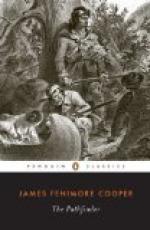“Ay Pathfinder; but Jasper did not get his French as a prisoner: he took it in his boyhood, when the mind is easily impressed, and gets its permanent notions; when nature has a presentiment, as it were, which way the character is likely to incline.”
“A very just remark,” added Cap, “for that is the time of life when we all learn the catechism, and other moral improvements. The Sergeant’s observation shows that he understands human nature, and I agree with him perfectly; it is a damnable thing for a youngster, up here, on this bit of fresh water, to talk French. If it were down on the Atlantic, now, where a seafaring man has occasion sometimes to converse with a pilot, or a linguister, in that language, I should not think so much of it, — though we always look with suspicion, even there, at a shipmate who knows too much of the tongue; but up here, on Ontario, I hold it to be a most suspicious circumstance.”
“But Jasper must talk in French to the people on the other shore,” said Pathfinder, “or hold his tongue, as there are none but French to speak to.”
“You don’t mean to tell me, Pathfinder, that France lies hereaway, on the opposite coast?” cried Cap, jerking a thumb over his shoulder in the direction of the Canadas; “that one side of this bit of fresh water is York, and the other France?”
“I mean to tell you this is York, and that is Upper Canada; and that English and Dutch and Indian are spoken in the first, and French and Indian in the last. Even the Mingos have got many of the French words in their dialect, and it is no improvement, neither.”
“Very true: and what sort of people are the Mingos, my friend?” inquired the Sergeant, touching the other on his shoulder, by way of enforcing a remark, the inherent truth of which sensibly increased its value in the eyes of the speaker: “no one knows them better than yourself, and I ask you what sort of a tribe are they?”
“Jasper is no Mingo, Sergeant.”
“He speaks French, and he might as well be, in that particular. Brother Cap, can you recollect no movement of this unfortunate young man, in the way of his calling, that would seem to denote treachery?”
“Not distinctly, Sergeant, though he has gone to work wrong-end foremost half his time. It is true that one of his hands coiled a rope against the sun, and he called it querling a rope, too, when I asked him what he was about; but I am not certain that anything was meant by it; though, I daresay, the French coil half their running rigging the wrong way, and may call it ‘querling it down,’ too, for that matter. Then Jasper himself belayed the end of the jib-halyards to a stretcher in the rigging, instead of bringing it to the mast, where they belong, at least among British sailors.”
“I daresay Jasper may have got some Canada notions about working his craft, from being so much on the other side,” Pathfinder interposed; “but catching an idee, or a word, isn’t treachery and bad faith. I sometimes get an idee from the Mingos themselves; but my heart has always been with the Delawares. No, no, Jasper is true; and the king might trust him with his crown, just as he would trust his eldest son, who, as he is to wear it one day, ought to be the last man to wish to steal it.”




